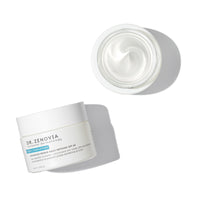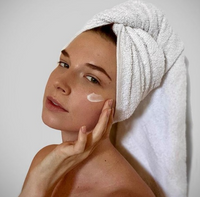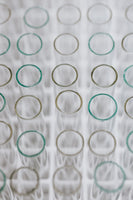How to Treat & Prevent Hormonal Acne Breakouts | Acne Sessions with Dr. Zenovia

All pimples including blackheads, whiteheads, cysts, and red marks have a hormonal component. Hormonal acne is cyclical and commonly found along the jawline region. In this post, Dr. Zenovia deep dives into the science behind the formation of acne breakouts, including the hormonal component. She also offers her top tips to treat and prevent hormonal breakouts.
The Science Behind Acne Breakouts
Acne breakouts take place for a few reasons. Firstly, our hair follicles (or pores) are meant to shed every 14-21 days. Acne-prone skin experiences clogged hair follicles and aren’t shedding (desquamating) appropriately. Secondly, when our oil glands that are attached to our hair follicles get stimulated by hormones in our body, this triggers the sebaceous glands to produce oil. Producing oil from our sebaceous glands is normal- the oil sits on top of our skin until the skin is cleansed. However, when the oils become trapped in clogged follicles, we experience oil build-up. A clogged follicle coupled with oil production is what's involved in the formation of acne breakouts.
The Hormonal Component of Acne Breakouts
Our oil glands have hormone receptors which makes some of us acne-prone teenagers or oil-producing adults. Two-year old's and seventy-year-olds don’t get acne because they don’t experience any hormonal stimulation of their oil glands.
The hormones involved in the formation of acne are a combination of estrogen, progesterone, and testosterone. These are the three androgen (sex) hormones in our blood. Women have more estrogen compared to men, but men need estrogen as well. Men have more testosterone compared to women.
Androgen Hormones & Acne
Throughout a woman’s menstrual cycle, the estrogen and progesterone ratio fluctuate in the bloodstream. Men also experience hormonal fluctuations seasonally. As the ratio of these sex hormones changes in relation to each other, many women experience hormonal acne. For example, when a woman ovulates, her progesterone is high and estrogen a bit lower. As she gets closer to her period, the level of progesterone rises causing oil gland stimulation. Hormonal acne is therefore a deep physiologic process that takes place underneath the skin and is regulated by our hormones, ovaries, and testicles.
Stress Hormone & Acne
The stress hormone cortisol is produced by our adrenal gland, a small gland that sits on top of the kidney. Cortisol is massively important to be alive- it regulates our sleep cycles, blood pressure, and stress levels. When we are stressed out, we experience elevated cortisol levels which alters our inflammatory state. Acne is an inflammatory process so when our inflammation worsens, we tend to experience acne flare-ups. Combined with fluctuations in sex hormones, hormonal acne breakouts take place.
How to Treat & Prevent Hormonal Acne
Hormonal acne treatment and prevention must be done from a 360 holistic and comprehensive perspective. This may include adjusting your diet, incorporating effective acne-fighting actives into your skincare routine, or discussing birth control or other prescription medication options with your doctor.
Low Sugar Diet
If you are experiencing hormonal breakouts, adhering to a low sugar diet can help reduce inflammation. Dr. Zenovia also recommends staying away from animal meats and dairy. These foods increase our body’s inflammation-producing enzymes that attach and break down the skin’s collagen. This process, known as glycation, can worsen acne and cause the skin to age faster.
Healthy Lifestyle Habits
Healthy habits including hydration, quality sleep, and exercise are imperative for overall skin health. Our skin cells do most of their regeneration and turnover overnight so getting enough sleep is essential! Additionally, if you’re not drinking enough water, your body is going to be dehydrated and this will affect your skin. Follow the 8-8 rule: Aim to drink at least eight 8-ounce glasses of water daily to maintain your hydration levels. 30 to 60 minutes of physical activity every day also helps with total body inflammation which impacts the skin.
Retinol For Acne Prevention
With acne-prone skin, the epidermis clogs itself. Using a retinol will help improve the shedding of the hair follicle and prevent the pores from clogging. Dr. Zenovia’s Advanced Retinol Night Repair Treatment helps fight both acne and aging. The formulation is highly effective without causing irritation. If you are new to using a retinol, Dr. Zenovia recommends applying a pea-sized amount to the face and neck 2-3 times a week at night. Be sure to apply it all over the face after cleansing. Retinol is not a spot treatment! This powerful ingredient will help open the pores and prevent the formation of future pimples.
Benzoyl Peroxide for Clogged Pores
When your pores are clogged, oxygen cannot enter, and bacterial overgrowth takes place. As an anti-bacterial, benzoyl peroxide can help acne-prone skin. However, it is important to note that not all benzoyl peroxide products are created equally. Many are formulated in alcohol vehicles, making them very irritating which can further skin inflammation. Dr. Zenovia’s 5% Benzoyl Peroxide Acne Spot Treatment contains highly micronized benzoyl peroxide making it effective and non-irritating. Applying a spot treatment can help whiteheads, blackheads, and cysts clear up.
Note from Dr. Zenovia: It’s important to gradually introduce ingredients like Benzoyl Peroxide and Retinol into your skincare regimen. If excessive dryness or irritation occurs, reduce application. Additionally, as these ingredients can increase sensitivity to the sun, be sure to follow with SPF during the day.
Squalene For Inflammation
Painful pimples may feel red and hot. That is your body and the immune system trying to kill the bacteria. To soothe inflamed skin, Dr. Zenovia recommends using a hydrating moisturizer morning and night. Our Aloe Vera Blemish Soothing Moisturizer contains squalene, a skin smoothing and soothing emollient with anti-inflammatory properties that help reduce swelling and redness. This lightweight, oil-free moisturizer is also formulated with medical-grade aloe vera, green tea polyphenols, caffeine, and vitamin e to nourish and calm the skin.
Phytoestrogens for Hormonal Balance
All of Dr. Zenovia’s Skincare products are formulated with our proprietary REG-ulate360 Complex™ that contains a phytoestrogen which helps dampen the testosterone effect on the skin, elevating the local estrogen effect. The phytoestrogen does not go in your body or affect other organ systems- it is safe and plant-based.
Hormonal Birth Control Pills
For women, some hormonal contraceptives (birth control pills) can help with acne. Oral contraceptives provide progestin with a non-androgen-like effect. There are different types of progestins in the body. Some have a high androgen effect (which is closer in shape to testosterone) and stimulate the oil glands more. Non-androgen progestins help fight acne because they have a low androgen effect. It is androgen-like effect hormones that cause acne.
Note from Dr. Zenovia: If you aren’t seeing any improvement in your skin after three months of at-home treatments or your acne is severe or cystic, Dr. Zenovia recommends booking a consultation with a board-certified dermatologist. In-office skin treatments or prescription medications may help.
Join In Our #ACNESESSIONS with Dr. Zenovia!
Game-changing skin knowledge in 5 FREE classes featuring acne-fighting content personally developed and taught by award-winning Board-Certified Dermatologist and Hormonal Acne Expert, Dr. Zenovia.
#ACNESESSIONS WITH DR. Z are 30-minute interactive sessions with clear and real answers to your acne issues – including a live Q&A where registered participants can get their most burning acne questions answered in real-time by Dr. Zenovia.










Leave a comment